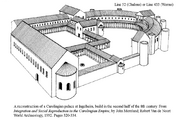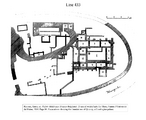Difference between revisions of "Waltharius419"
| Line 130: | Line 130: | ||
}} | }} | ||
| | | | ||
| − | | | + | |{{Pictures|<gallery widths="180px" heights="120px" perrow="2"> |
| + | File:Waltharius-Line-52-(Chalons)-or-433-(Worms).png | ||
| + | File:Waltharius-Line-433.png | ||
| + | </gallery>}} | ||
|{{Meter|scansion=DDSSDS}} | |{{Meter|scansion=DDSSDS}} | ||
| | | | ||
Revision as of 00:35, 27 August 2009
Flight of Walther and Hildegund to the area of Worms (419–435)
| Waltharius fugiens, ut dixi, noctibus ivit, | DDSSDS | |||||
| Atque die saltus arbustaque densa requirens | 420 | DSSDDS | ||||
| Arte accersitas pariter capit arte volucres, | SSDDDS Elision: arte accersitas |
|||||
| Nunc fallens visco, nunc fisso denique ligno. | Fisso…ligno: a kind of trap for birds, consisting of a piece of green wood split down the middle with the two halves held apart at one end, such that when a bird arrives, attracted by bait scattered in the middle, the two halves will snap together and break its legs.
|
Georgics 1.139-140.: tum laqueis captare feras et fallere visco/ inventum. ‘Then was discovered how to catch game with traps and to snare birds with lime.’ Aeineid 9.413-414.: hasta. . .fisso transit praecordia ligno. ‘The spear pierces the midriff with the broken wood.’
|
SSSSDS | |||
| Ast ubi pervenit, qua flumina curva fluebant, | Georgics 2.11-12.: camposque et flumina late/ curva tenent. ‘Far and wide they claim the plains and winding rivers.’
|
DSSDDS | ||||
| Immittens hamum rapuit sub gurgite praedam. | Georgics 4.395: sub gurgite. . . ‘Beneath the wave. . .’
|
SSDSDS | ||||
| Atque famis pestem pepulit tolerando laborem. | 425 | DSDDDS | ||||
| Namque fugae toto se tempore virginis usu | Virginis usu: The poet praises Waltharius for abstaining from sexual intercourse.
|
DSSDDS | ||||
| Continuit vir Waltharius laudabilis heros. | DSDSDS | |||||
| Ecce quater denos sol circumflexerat orbes, | Quater denos: the length of time is perhaps of biblical inspiration.
|
Aeineid 5.131: circumflectere cursus. . . ‘To double round the courses. . .’
|
DSSSDS | |||
| Ex quo Pannonica fuerat digressus ab urbe. | SDDSDS | |||||
| Ipso quippe die, numerum qui clauserat istum, | 430 | SDDSDS | ||||
| Venerat ad fluvium iam vespere tum mediante, | Vespere…mediante equiv. to medio vespere
|
Secundum Iohannem 7.14: iam autem die festo mediante. . . ‘Now about the midst of the feast. . .’
|
DDSDDS | |||
| Scilicet ad Rhenum, qua cursus tendit ad urbem | Rhenum: the Rhine River.
|
Aeineid 5.834: cursum contendere iussi. ‘They are bidden to shape their course.’ 12.909: nequiquam avidos extendere cursus/ velle videmur. ‘We seem to strive in vain to press on our eager course.’
|
DSSSDS | |||
| Nomine Wormatiam regali sede nitentem. | Wormatiam: Worms, a city on the Rhine in present-day Germany, here the capital (regali sede) of the Franks, now ruled by Gunther. The route that Waltharius is taking home is a very circuitous one.
|
|
DDSSDS | |||
| Illic pro naulo pisces dedit antea captos | Naulo: “fare” for being ferried across the river.
|
Iona Propheta 1.3: et invenit navem euntem in Tharsis et dedit naulum eius. ‘And he found a ship going to Tharsis: and he paid the fare thereof.’
|
SSSDDS | |||
| Et mox transpositus graditur properanter anhelus. | 435 | SDDDDS |
| « previous |
|
next » | English |

